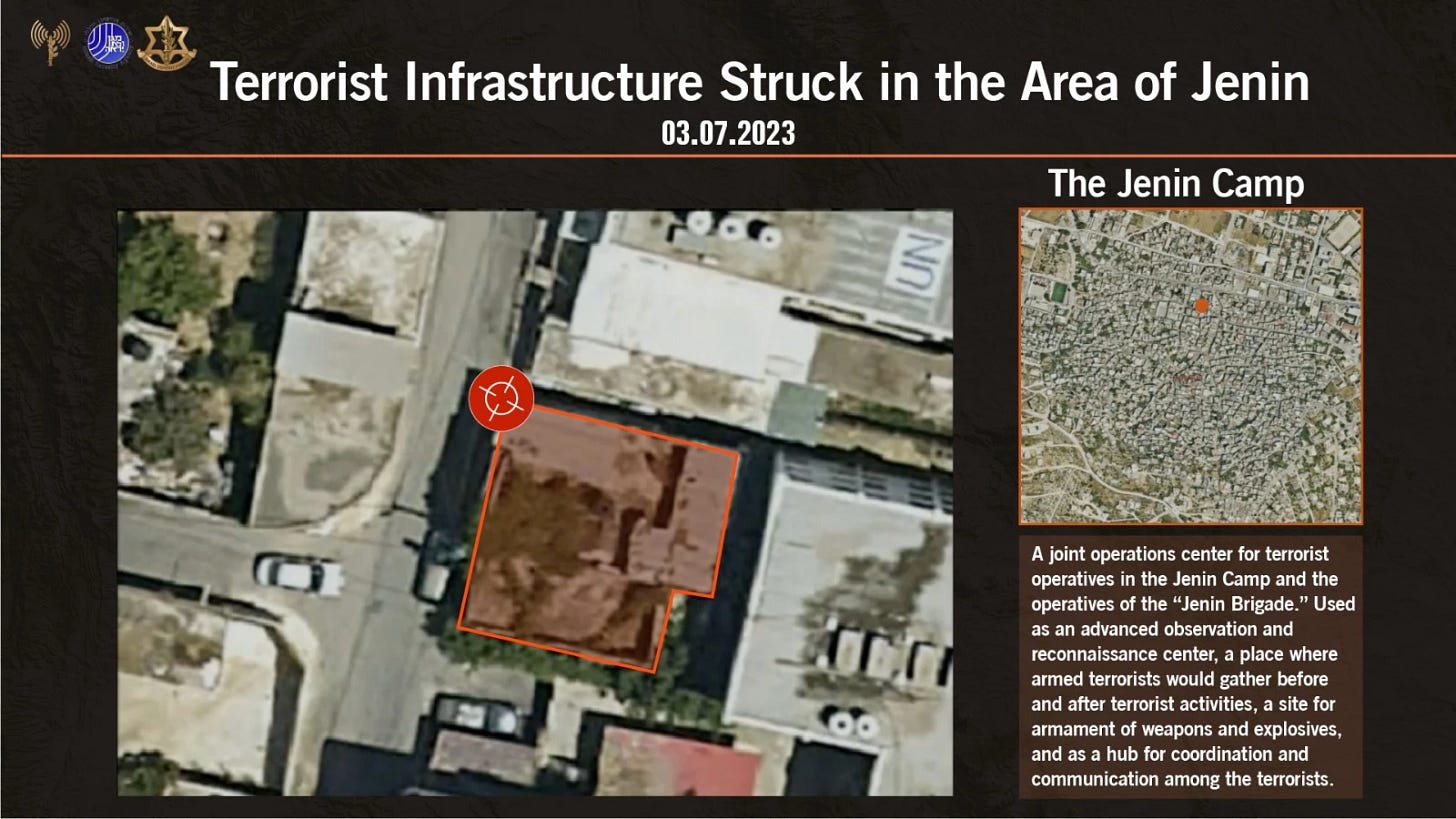Tel Aviv Diary June 7, 2023
Jenin, Terror in Tel Aviv, Protest accelerate as top cop in Tel Aviv sacked,economy,review and more.
RAID INSIDE SYRIA
The week started out with a raid reportedly conducted by Israeli planes on targets within Syria. In retaliation, the Syrians launched anti-aircraft missiles at the planes. All the Syrian missiles missed their targets, yet one continued flying, passing over much of Israel until it exploded over the Bedouin town of Rahat in the Negev. Luckily, no one was hurt by the missile fragments which fell on the town. According to Arab media, an Iranian Revolutionary Guard General was killed in the attack.
OPERATION IN JENIN
In the early hours of Monday morning, Israel launched a significant military operation in Jenin, in the Northern West Bank. The IDF reported that since last year, some 50 shooting attacks were conducted by individuals from Jenin; in addition, 19 wanted Palestinians escaped to Jenin to evade Israeli forces. In addition, you may recall, last week I reported on a rocket fired towards Israel from Jenin. After assessing the situation, the IDF decided there was no other choice but to enter Jenin, targeting the refugee camp, in an effort to dismantle as much of the terrorist infrastructure as possible. On this front, the raid was successful
.
The IDF force, composed of over 1,000 soldiers, managed to seize a substantial quantity of bombs, bomb-making equipment, and explosives. The raid was initiated with a surprise air strike that destroyed the terrorist command center. The attack was effectively executed with minimal resistance, as most of the terrorists fled, making it easier to capture the materials without large firefights.
Remarkably, in such a densely populated urban environment, no civilian casualties were reported. All 11 Palestinians killed were identified as members of terrorist organizations. One Israeli soldier was wounded by a grenade and, tragically, another was killed at the end of the operation. It is suspected that that soldier may have been a victim of friendly fire, a tragic, yet not uncommon occurrence in urban warfare involving multiple separate units.
TERROR ATTACK IN TEL AVIV
Prior to the troops withdrawing from Jenin, a terror attack occurred in north Tel Aviv. A 20-year-old Palestinian drove into a bus stop before exiting his vehicle and starting to stab people at a nearby cafe. A civilian in the area shot and killed the attacker. Seven people were wounded, six of whom remained hospitalized as of Thursday morning, with two in critical condition. Tragically, one of the victims in critical condition, a pregnant woman, lost her baby.
In the early hours of Wednesday morning, five rockets were fired at Israel from Gaza. All were intercepted, though parts of a rocket fell on a house in S’derot.
MORE ON DEFENSE
On Thursday afternoon a Palestinian stopped at an army checkpoint and opened fire, resulting in the death of Staff Sgt. Shilo Yosef Amir. The assailant was pursued and killed by the army a short time later. On Friday morning the army entered Nablus in response to another terror attack near Har Bracha in the West Bank. The two terrorists responsible for the attack were killed.
Thursday morning brought more conflict, when a rocket was fired from Lebanon, landing on the Israeli side of the border. Israel retaliated by targeting the origin of the rocket fire.
LACK OF STRATEGIC THINKING
Once again, we observe tactical success by the IDF, absent a long-term strategic plan. Regrettably, successive Israeli governments, dating back to Levi Eshkol’s tenure (immediately following the Six-Day War), have failed to develop a comprehensive blueprint for the West Bank. The Rabin government initiated the Oslo process and the conceptualization of some form of Palestinian proto-State. Arik Sharon aimed to limit interactions between Jews and Palestinians, leading him to construct a separation wall, evacuate all the Israeli settlements from Gaza, and remove a few Israeli settlements from the northern part of the West Bank. However, since then, there hasn’t been any serious discussion about the future for Israelis and Palestinians.
Given the composition of the current government, such a discussion seems wholly unlikely. The ministers charged with overseeing the West Bank fundamentally hold messianic beliefs, that God gave us all of “Eretz Yisrael” and trust God will somehow resolve the problem. This mindset contradicts the core principles of Zionism, which emphasizes that we should shape our own future. To do so requires a clear understanding of what we want to achieve. We’ve spent years muddling through and optimistically hoping for the best. Henry Kissinger once said that Israel does not have a foreign policy, just domestic politics. Regrettably, this extends to the future of the West Bank.
JUDICIAL OVEREACH
Led by MK Simcha Rothman, the Knesset Law Committee has approved the initial reading of legislation to eliminate the judicial review of government actions based on the status of their reasonableness. While this might appear minor, it carries much wider implications. As recently articulated by Nadav Eyal, the court’s ability to review laws to assess their reasonableness prevents the government from passing legislation that its legal advisors warn could be deemed unreasonable. If elimination of the reasonability clause was the only element of the proposed judicial overhaul, it would be problematic, but not catastrophic. However, opponents of the overhaul recognize that this step is just the first act, and as such, they are unwilling to allow it to pass into law without considerable opposition.
On Monday 20,000 people traveled to Ben Gurion Airport to protest the Judicial overhaul. While all flights left on time, travelers were forced to either come by train or arrive early. The goal was never to bring activities at the airport to a halt but to make it clear they could.
In addition to the weekly Saturday night protests, which have continued for their 26th week, on Thursday night, protests were held outside the homes of all the member of Knesset. On Tuesday there are planned massive demonstrations in many points around the country, as the fear is that on Monday the coalition will vote to pass in the first reading to remove the Reasonability Clause.
Leader of the National Unity Party, Benny Gantz held a press conference on Thursday calling on Netanyahu to reopen negotiations on the Judicial reform proposal at the President's House. The talks to reach a compromise proposal had been suspended by Gantz and Lapid when the government broke its agreement concerning the selection process of members for the judicial selection committee. Gantz warned that without negotiation, the subsequent government would reverse any actions taken by the current administration in this regard.
AGGRESSIVE COALITION MANEUVERS
Government supporters lost the election for the leadership of the Israeli Bar Association two weeks ago. The Bar Association wields significant power, including the placement of two representatives on the committee for judicial appointments. As a result of this defeat, the government has introduced and passed, the first reading of a law that would strip the Bar Association of all its powers.
While this bill was only at the first reading stage, alongside the bill to eliminate reasonableness as a tool of judicial review, two other contentious bills were passed by the coalition this week. These two additional bills were designed to accommodate the wishes of former Interior Minister and political kingmaker, Aryeh Deri. The first was to delay the election of new Rabbinic chief judges. Deri, unsure if he wants his brother or another close confidant to assume the role, sought to delay the vote.
The second law that was passed permits someone appointed as a city's receiver (an appointment made by the Ministry of Interior to temporarily manage a poorly-run city) to then run for Mayor. In this instance, Deri, while serving as Interior Minister, appointed Boaz Yosef, a close ally from Shas, to be the caretaker mayor of Tiberias. Now, Yosef wishes to stay on as mayor. To understand the complexity of Israeli politics, consider that Yosef's potential opponent is a Likud candidate who would likely win if Yosef does not run. Despite this, Likud supported Deri’s bill, even though it contravenes the very principles of Israeli law, as it is a “personal law,” designed for the benefit of one person.
TEL AVIV DISTRICT POLICE COMMANDER SACKED
On Wednesday evening, Tel Aviv Police Chief Ami Eshed announced his retirement from the force in a brief, but powerful speech. Eshed declined his reassignment to the Education Division of the police. Prior to Ben-Gvir becoming National Security Minister, Eshed was a leading candidate for the position of Police Commissioner. Eshed asserted that his removal from the leadership of the Tel Aviv district police was politically motivated. He defended his actions as the Tel Aviv police grappled with months of demonstrations, stating
:
"We could have cleared the highway in minutes at a terrible cost of cracking heads and breaking bones, at the consequence of breaking the pact between police and citizenry. As commander, I taught generations of officers to recognize the limits of force, and to protect our contract with the public”
After Eshed spoke, the word went out on Social Media for people to spontaneously head to Kaplan St. in Tel Aviv to demonstrate. Within an hour (around 9PM), over 20,000 people had showed up. Before long, the protesting mass had streamed onto the Ayalon, the main highway transecting Tel Aviv. For three hours the Ayalon was blocked, as demonstrators started bonfires and blocked the road. The police used water cannons, including several that sprayed a foul-smelling liquid to clear the road. A driver intentionally ran over a demonstrator who was only lightly wounded. The driver was arrested and then released without charges being brought.
While the Tel Aviv demonstration in support of Ami Eshed was the largest, smaller demonstrations erupted throughout the country.
A PIECE OF HISTORY— SUEZ WAR
In the aftermath of the War of Independence, the British, Americans, and French collectively agreed not to provide significant quantities of armaments to either the Israelis or the Arabs. However, in October 1955, Egypt signed a notable arms deal with Czechoslovakia, securing substantial military equipment for themselves. This agreement, combined with ongoing Fedayeen raids in southern Israel, led Israeli leaders to conclude that action must be taken to alleviate the situation before Egyptian forces could achieve strategic dominance.
On July 26, 1956, President Nasser of Egypt nationalized the Suez Canal, providing the British and French—who had already been supplying Israel with advanced weapons—with a motive to cooperate with Israel's attack on Nasser. This decision significantly impacted global shipping and trade, as the canal was a crucial passageway for maritime traffic
.
On October 29, 1956, Israeli forces launched an attack on Egyptian forces in the Sinai during what came to be known as the Suez Crisis. Israeli forces swiftly defeated the Egyptians, losing only 180 soldiers, inflicting over 1,000 fatalities on the Egyptian side, and capturing over 6,000 Egyptian prisoners of war. The Israeli forces halted their advance 10 miles short of the canal, creating a pretext for the British and French troops to intervene ostensibly to protect the waterway.
However, under sustained American pressure, Israel was compelled to withdraw from the Sinai Peninsula and the Gaza Strip. In exchange, the Straits of Tiran, a crucial maritime passage for Israel, were opened for Israeli shipping, and a United Nations force was placed in the Sinai and Gaza Strip as a buffer to further conflict.
ECONOMY
The fundraising activities of Israeli startups have significantly declined, although not as sharply as previously reported by IVC and SNC research departments. According to a semi-annual report covering January to June 2023, released by venture capital firms Viola and JVP, the actual fundraising volume of Israeli startups was higher than previously indicated. According to Viola's report, the fundraising volume of Israeli startups reached $3.2 billion in the first half of the year (a 75% drop compared to the same period last year); while globally, fundraising decreased by 50% to a total of $168 billion. IVC reported fundraising volumes in Israel were lower during this period. The discrepancy, as explained by Viola, is attributed to multiple expansion rounds and lower-value financings, which companies often delay reporting, leaving the information known only in boardrooms.
BUSINESS
Startup company RoboDeck has successfully raised a $2 million pre-seed funding round led by SOSV and featuring participation from Scalar Ventures, Atz VeAtz, and private investors including entrepreneur Ziv Allul. RoboDeck has developed the world's first and only robot for the maintenance of decking surfaces in office buildings, urban areas, walkways, restaurants, hotels, and private homes. The company has introduced a new concept of preventive maintenance, where the robot autonomously performs maintenance several times a year, ensuring a stunning appearance year-round. RoboDeck's AI-based technology optimally treats decks by leveraging real-time data and environmental information, resulting in non-fading, safer, and longer-lasting surfaces. The company aims to address the growing labor shortage in the decking industry by providing a technology-driven solution.
Cybersecurity company Astrix Security, which specializes in protecting connections between applications within organizations, has announced a $25 million fundraising round. The round was led by CRV with participation from existing investors, such as Sumar and F2. In total, the company has raised $40 million, including the current round
.
Organizations often use dozens or even hundreds of third-party applications to perform various tasks. Some of these applications come from large suppliers, while others are developed by smaller organizations with less emphasis on security. When smaller applications connect to larger ones, a problem arises because the smaller ones may gain access to sensitive information.
Israeli startup Wenrix has raised $15 million in its third funding round since its establishment in 2017. The funding was led by American venture capital firm Insight Partners. Wenrix has developed an AI system for predicting flight ticket prices and had previously raised $8 million. The current funding brings the total raised to $23 million.
Wenrix operates in 37 countries and signed a strategic agreement with trip.com, one of the world's largest travel groups, a year ago for the development and implementation of a new product line for companies in the group. The algorithm developed by Wenrix helps optimize flight ticket bookings at minimal prices. Wenrix is headquartered in Tel Aviv and employs 50 people. It was founded by former members of the Israeli military's Unit 8200. Most of the company's management is made up of Unit 8200 veterans who partnered with the founders during their military and professional service.
A TASTE OF TEL AVIV—CEVICHE BAKEREM
A RESTAURANT REVIEW, by Tali Schulman
As you venture down Haim Havshush Street from Shuk HaCarmel into Kerem HaTeimanim, you will come across a small shop called “Ceviche Bakerem”. Originating as a pop-up just around the corner at the owner Noy's home, Ceviche Bakerem experienced tremendous success. After a short period, Noy relocated the pop-up to the Shuk, and eventually secured a permanent establishment on one of Kerem Hateimanim's main streets.
The menu at Ceviche Bakerem is refreshingly simple, offering four options that draw inspiration from flavors found in various cuisines across the globe: Japanese, Thai, Mexican, and Mediterranean. While my personal favorite is the Japanese variation, each option is crafted using fresh ingredients sourced from the Shuk, ensuring a delicious meal no matter which you choose.
For more Tel Aviv restaurant recommendations, you can find me on Instagram @talischulman where I save all my food adventures in my highlights!
IN MEMORIUM
One of the readers of this newsletter posted a quote from David Ben Gurion on my Facebook page that said: “If you want a friend in Israel, get a dog.” While I have many friends in Israel, some of which I made in the last nine years thanks to the interactions I had with other dog owners, Mac was truly my best friend these past almost nine years. As I write this it is hard not to turn around expecting Mac to be right behind me as I write and work. He was loving from the moment we met him until moments before his death. He will be missed terribly.










In your latest SubStack you wrote: “ Once again, we observe tactical success by the IDF, absent a long-term strategic plan. Regrettably, successive Israeli governments, dating back to Levi Eshkol’s tenure (immediately following the Six-Day War), have failed to develop a comprehensive blueprint for the West Bank.”
I beg to differ. The long-term strategic plan, while unstated and unwritten, is to hold and control all of the territory between the Jordan River and the Mediterranean while maintaining a pseudo Jewish majority through the denial of equal political rights to millions of non Jewish Palestinians. This has resulted in a regime and policy which has many aspects of apartheid.
It has been the tacit and explicit policy of every Israeli government since 1967 despite statements to the contrary. In the final analysis one should examine what is being done on the ground rather than what ministers have said. The actual actions on the ground, of support for widespread settlement and control, contradict any statements of support for a two state solution. When the obvious, unstated aim, is to control and keep the Jordan Valley as well as maximal areas in the WB with minimal Palestinians, the aims, objectives and policies are clear.
To repeat myself, if you want to know what Israeli policies are vis-a-vis the Palestinians and the WB then simply look at what is being done and disregard what is being said.